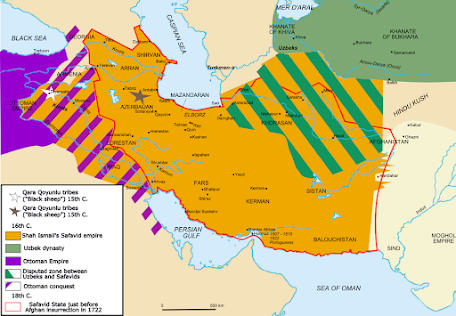
Map of Persia between 16th and 18th century (Source.)
Duarte Barbosa (Ramusio). 1515.
COUNTRY OF SHEIKH ISMAIL.
After passing these countries along the coast of Persia, there are many towns, places, and villages of the Moors, very handsome and rich enough. From here further on it is no longer the country of the king of Ormuz, but belongs to other lords, of whom we do not possess so much information, except that Xeque Yzmael subjugates and governs them.
So this Sheikh Ismail took this habit, and determined to shout and cry out for Aly, whilst he took no heed of Mahomed. Many people began to collect round him, so that he began soon to take towns and to grant property to the persons who flocked to him, and were with him at a conquest; and, in case they took nothing, he decided on making some hoods of scarlet wool, of ample dimensions, and ordering them to be worn by the persons who followed him; thus he collected many people, and with them he went on taking many towns, and making war in many parts; and he did not choose to be called king, but the leveller of property, who took from those who had much, and gave to those who had little; neither did he choose to rest in any place.
But all that he conquered he gave away and distributed to those who followed and obeyed him; whenever he found any very rich people whose riches did not profit any one, he took them away and distributed them amongst honourable people and the poor; and to the owners of the property he left a share equal to that which he gave to each one of the others; this he did many times, on which account they called him the Equaller.
This king sent ambassadors to all the Moorish kings to persuade them to wear those coloured hoods, and if they did not choose to accept them, he sent to challenge them, and to say that he would come against them, to take their country, and make them believe in Aly.
He sent this embassy to the great Sultan of Cairo and to the Grand Turk, who gave him a hostile answer and made a league against him. As soon as Sheikh Ismail saw their answers he determined to go against the Grand Turk, and he went against him with large forces, horse and foot, and the Turk came out to receive him, and they had a great battle, in which the Grand Turk was the conqueror, on account of the quantity of artillery which he brought with him, which Sheikh Ismail did not bring, and he only fought with his men with the strength of their arms.
They killed there many of his people, and he took to flight, and the Turk followed him, killing many of his troops, until he left him within Persia, when he returned thence to Turkey.
This was the first time that this Sheikh Ismail was routed, for which he said that he wished to return to Turkey with greater power and provided with artillery. This king ruled over a part of Babilonia, and Armenia, and Persia, and a large part of Arabia, and of India, near to the kingdom of Cambay. His design was to get into his hands the house of Mekkah.
This sheikh sent an embassy with many presents to the captain of the king of Portugal, who was exercising his functions in India, and asked him to agree to peace and friendship. And the Portuguese captain-major received this embassy and presents, and in return sent another embassy.
At the extremity of this Sea of Persia there is, as has been said, a fortress called Basera, inhabited by Moors, in subjection to Sheikh Ismail, at which there comes out from the mainland to the sea a very large and beautiful river of good fresh water, which is called Frataha.
This is said to be one of the four rivers which flow out of the terrestrial Paradise, which river is the Eufrates, and these Moors say it has sixty thousand branches, and that one of the principal ones comes out at the kingdom of Dahulcino, in which is the first
India, which we call the river Indus; and the river Ganges is the other branch, which comes out in the second India to the sea; and the Nile, which is another branch, which comes through the country of Prester John, and waters Cairo.
